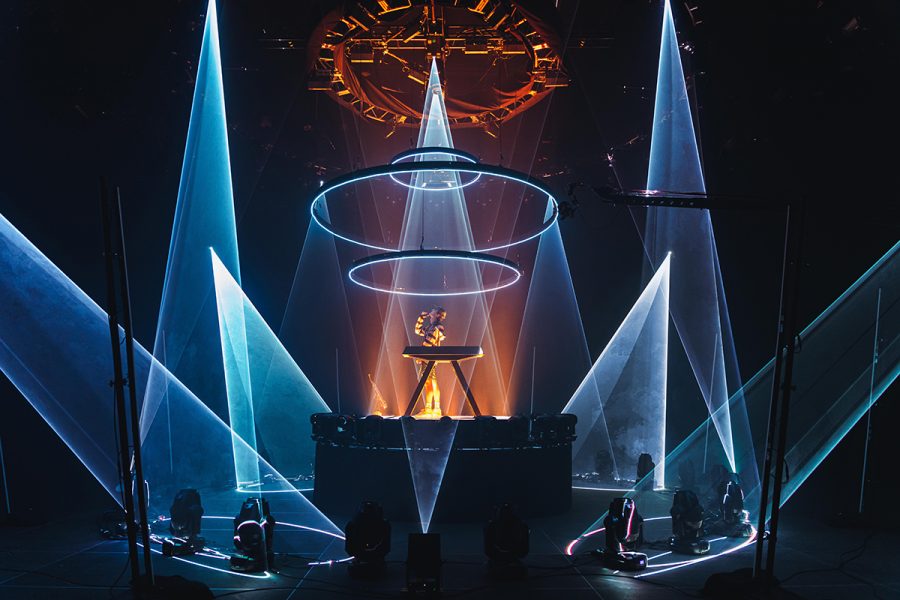Filmed at the Mission Ballroom in Denver, US, Rainbow Brain The Movie was an immersive, theatrical livestream performance that transported viewers into four on-screen universes, changing in colour and theme to reflect the narrative of GRiZ’s seventh studio album, Rainbow Brain. A nod to the renaissance of bass music and dubstep’s golden age, the production featured striking visuals, special guests, and a combination of bespoke production and virtual elements. “It’s an imagination of the place I would escape to while working on the album – the place where these songs lived visually in my brain,” GRiZ informed TPi, explaining the creative concept of the project and praising the technical production crew involved.
Production Designer, Kyle Kegan and Lighting Director, Ian Davis pulled out all the stops to devise the visuals for a six-figure production to accompany the livestream and bring it to life, harnessing the creative capabilities of production companies, Verax Creative, Creative Butter, Boulder Media House, Voyage Productions, Quantum SFX, Dark Moon Designs. “GRiZ had the vision, and we brought it to life for him,” Kegan began, modestly. “COVID-19 has impacted us heavily on the live music front, making it near impossible to put on any live event. This came about as a result of GRiZMAS,” he said, referencing a broadcast the team produced in place of their annual live show in December. “That show matured into Rainbow Brain The Movie, which is the culmination of months of work on the entire team’s part.”
Rainbow Brain The Movie was shot during the height of the COVID-19 pandemic, so performing artists and technical production crew were tested and wore masks, adhering to social distancing rules as much as possible throughout the production. “We also did this with as minimal crew as possible and everyone really stepped up to help in areas that are usually spread across a larger team,” Kegan said, acknowledging the devastating effect of the COVID-19 pandemic on the sector’s workforce. “We have kept in touch with as many people as possible during these tough times. If we had it our way, we would have loved to have everyone out for this show.”
The livestream was much like a broadcast; two computers in one location connected to fibre internet to encode a 4K and a HD stream, while the team utilised a cloud-based re-streaming server. “The speed of innovation in live events will continue to increase rapidly. With the help of technology, there are more ways to connect with others than ever before,” Kegan said, referencing the potential of transporting an at-home audience via Zoom into any live visual experience.
“The power of chat is also important to the online streaming experience and just by bringing that onto the stage and into the room, people instantly become connected to the conversation happening online. With quality video production, those on the chat can start to feel more connected to the real world while sitting in the comfort of their home.”
Helping bring the project to life was a Brown Note Productions lighting rig, which boasted 48 Robe Mega Pointes and five BMFL Blades, 24 Elation Professional Dartz 360s, 24 Martin By Harman VDO Sceptrons, six Elation Professional SEVEN Batten LEDs, and eight Astera LED Titan Tubes, all controlled by an MA Lighting grandMA3 full size and additional grandMA3 Lite console. Not shying away from powerful looks, Quantum SFX supplied a range of lasers, including four 22W, eight 11W and a single 30W.
Kegan and Davis – assisted by Lighting Tech, Blake Addington, Laser Programmer, Mike Morgenstern, and Laser Tech, Ryan Berry – programmed the show through timecode using an MA Lighting grandMA3. “During the pandemic, we traded in our grandMA2 hardware for a grandMA3 light. We spent some time with the software and figured this was the perfect project to test drive it. Being a semi live shoot, we knew we had the perfect opportunity to push new software and hardware alike,” Kegan added. “We are excited to see where the software takes us over the next few years.”
On the broadcast side, there were two big challenges with this project: the short dropout on YouTube where their PC was encoding but YouTube wasn’t receiving, and the timing in starting each stream, with each experiencing a delay on Facebook, Twitch, and YouTube.
“We had to calculate the time that it took to hit the server and show on each site and then once we hit play on all PCs, we counted and hit Go Live on each social media site as the stream came in with the opening sounds and sights of the movie,” Kegan said, selling it as far more than a ‘one-button press’ operation.
In addition to lighting and lasers, the project featured custom set fabrications from Dark Moon Designs. Custom willow trees were crafted out of fiberglass, foam and LED branches with 3D printed leaves, overseen by Fabrication Designers, Natalia Janusz and Paul Thomas. “This was the central focus of the story as we stepped through various production looks with the LED rings, fabricated by Dark Moon Designs,” Kegan said. “These elements combined created some visually stunning looks.”
GRiZ outlined the laser banding shot as one of his favourite moments. “Seeing the way that it was captured through the lens. I also really enjoyed working with the tree that we made. We’ve never worked with fabricated set pieces – especially something that we could shoot in 360°, which really gave us a unique opportunity at different shots.” According to Kegan, there is a connection between the fans, the artists and everyone involved at a live show which is unquantifiable.
View this post on Instagram
“Everyone in the industry pushed the boundaries of technology to bring people the best experiences possible, but there is no replacement for live music,” he said, acknowledging that constraint often breeds innovation. “However, I am excited to see how we take everything we learned and bring it into the live aspects of these shows. There were so many smiles and laughs getting everyone back in the same room together again. We all had a great time off but were ready to be back in the thick of what we love.”
Far from a one-off, this project marks the beginning of a brand-new cycle for the GRiZ production team. “This is just the beginning of where we all want to take this project visually. It’s all about outdoing what we’ve done in the past and with what we have planned for the future, we truly believe that bringing this show to the large scale will be something unique,” he continued. “We have seen and been a part of exactly that. I think we’re going to see more creative ways of doing things as our industry evolves – especially now that we have harnessed the power of new technologies that may not have been around for us so soon.”
The wider technical production team included Production Manager, Stuart Karmatz and Production Assistant, Andrew Frost; Director, Michael Kirton; Producer, Tori Soper; Directors of Photography, Bailey Miclette and Tomas Morgan; FPV Drone Pilot, Troy Fairbanks; Camera Operators: Austin Nicklas and Wayne Schultheis; Editor, Tomas Morgan; Set Photographer, Frankie Zarantonello; Broadcast Engineer, Nick Bogannam; and Production Assistants, Zack Altschuler, Emma Harris and Parker Jones.
Optimistic for the future, GRiZ hopes to take his concept on the road. “I’m excited to play in some of our largest and most curated spaces yet and take the Rainbow Brain The Movie approach into large arenas. We’re also bringing along the fabricated tree to some of these events, where people will be able to witness the audio-visual experience with the tree as we bring new life to it.”
This article originally appeared in issue #265 of TPi, which you can read here.


